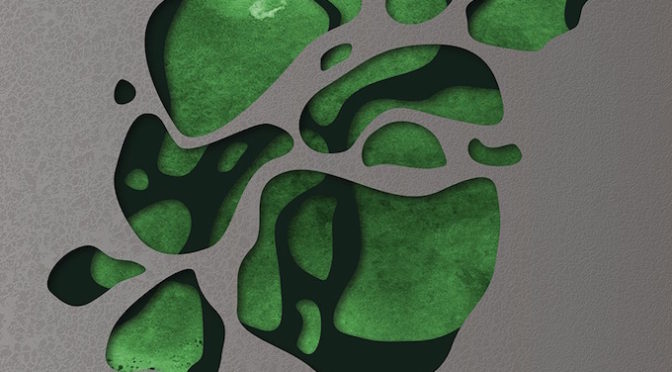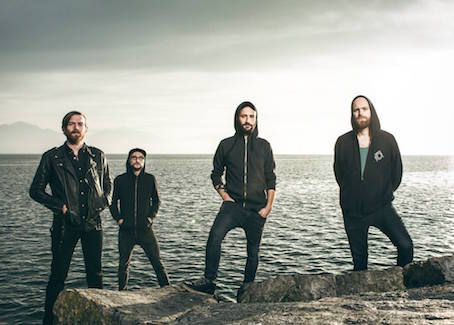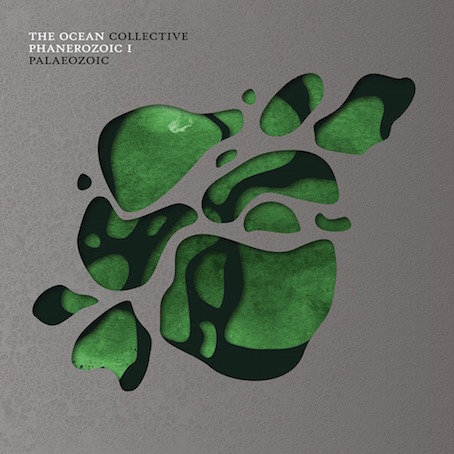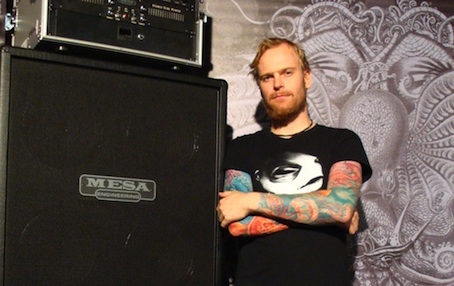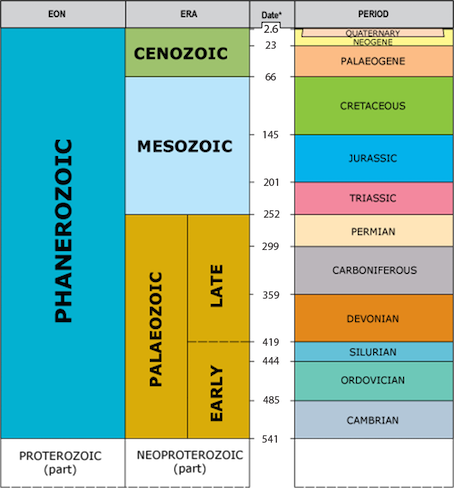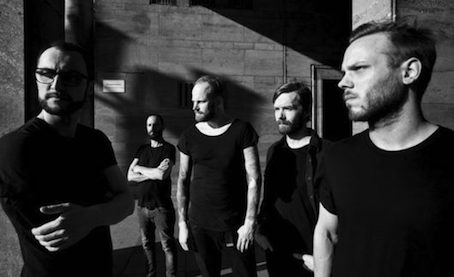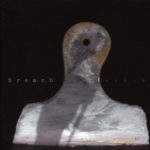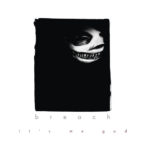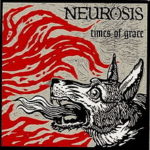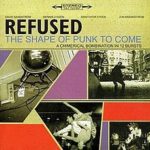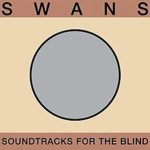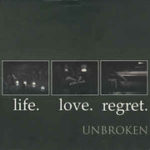EXCLUSIVE: INTERVIEW WITH ROBIN STAPS OF THE OCEAN !!
“I Don’t Have Any Delusions That Music Could Have a Real Direct Effect On Environmental Policies, But We Can Raise Awareness In The People That Listen To Our Music, And These People In The End Have a Vote.”
DISC REVIEW “PHANEROZOIC Ⅰ: PALAEOZOIC”
「MASTODON が “白鯨” の作者 Melville についての文学の教室なら THE OCEAN は地球科学の教室だろう。」”地球の地質に対するドイツからの賛歌” と讃えられるポストメタルの研究者 THE OCEAN は、全てのアートの母である自然とその摂理を音のビジュアルプレゼンテーションとして誰よりも濃密に響かせます。
アルバムや楽曲タイトル、リリックにサウンドスケープ。時にマジカル、時に険しい自然のイメージを知性的なメタルのフレームへと織り込み、エモーショナルで革新的なポストメタルの森羅万象を司るドイツの賢人は、そのディスコグラフィーさえも変化を繰り返す地球環境のクロニクルとしてメタルの図書館へと寄贈します。
2007年にリリースした二枚組 “Precambrian” は、地球が誕生し生命を育むまでの先カンブリア時代を縦横無尽に描き、シーンが求めるエピックの使者としてバンドをポストメタルの旗手へと導きました。そして11年の後にリリースする最新作 “Phanerozoic” は先カンブリアが終焉を迎え、肉眼で見える生物が跋扈する顕生代を綴った太古の続編となりました。
“Phanerozoic” も “Precambrian” と同様に長編ダブルアルバム。先立って今回リリースされた “Phanerozoic 1: Palaeozoic” は古生代、中生代、新生代と3つの時期に分類される顕生代の中から最初期の古生代を扱ったパートとなります。そしてその古生代自体もさらに6つの時代に分けられ、アルバムに収録された7曲 (カンブリア紀は2曲) がそれぞれの時代を描く実に学術的な構成となっているのです。
ただ THE OCEAN が今回、5度の大量絶滅を経験した顕生代を取り上げたのには、理由がありました。「僕は音楽が直接、環境問題に対するポリシーに影響を与えるなんて妄想は持っていないんだ。だけどね、僕たちの音楽を聴く人の関心を高めることは出来ると思っているよ。」バンドのマスターマインド Robin が語るように、アルバムは暗に現代における地球環境の変化、気温上昇に対する警告、注意喚起の意味を背負っているのです。
「パート1に収録されることとなった楽曲たちは、全てヘヴィーで荒涼としたヴァイブを持つという点で非常に首尾一貫しているね。」と語る Robin。実際、前作 “Pelagial” のしなやかな旋律と展開から距離を置き、重厚で哀愁に満ちたミッドテンポのコアへと帰結する “Phanerozoic 1: Palaeozoic” は年代的にも、哲学的にも、そして音楽的にも完璧なる “Precambrian” の続章です。
アルバムの全体的な審美性はまさしくポストメタルのアート、ダイナミズムへと傾倒しながら、ミニマルで装飾を削ぎ落としたスタイリングという意味ではよりソリッドな構築術への移行も伺えます。一方で意思を持たないしかし残酷な自然の暴走さえ巧みに操るコンポージングの妙、斬新的なモチーフは “Thinking Man’s Metal” を受け継ぐ思慮深きバンドのプログレッシブな精神を見事に体現していますね。
ボーカリスト Loïc Rossetti のメロディックな絶唱と獰猛な叫びは、楽器が奏でる構成美、ハーモニーへと荒波のように打ち寄せ絶滅する生命の苦痛を映し出し、アイルランドで収録した Paul Seidel のパーカッションは SIGUR ROSにも似た残響の刹那をレコードに封じます。創立以来40人ものメンバーが出入りする THE OCEAN にとって、新旧メンバーが噛み合い貢献を果たすコレクティブなプロセスは実は未知の領域でした。
そうして Jens Bogren の鮮やかな手腕は、暖かみのあるアナログシンセ、ピアノ、ヴァイオリンにチェロ、そしてゲスト参加を果たした KATATONIA の Jonas Renkse の歌声までをも完璧に制御し、ポストメタルの”境界の超越”、ポストモダニティーの多様性を提示しながらジクソーパズルのピースのように適材適所でアルバムのオーケストレーションを担ってみせました。
今回弊誌では、メタルシーンの賢者 Robin Staps にインタビューを行うことが出来ました。「もしかしたら、とても虚しい、非直接的で、即効性のないアプローチかも知れないね。だけどこれが僕たちに出来る精一杯だし、民主的なやり方ってものさ。僕たちは全く政治的なバンドではないけど、今は昔よりも幅広いオーディエンスにリーチ出来るようになったから、そのリーチを意味のある内容の拡散で使用したいと望んでいるんだ。」ぜひ耳を傾けてみてください。どうぞ!!
THE OCEAN “PHANEROZOIC Ⅰ: PALAEOZOIC” : 10/10
INTERVIEW WITH ROBIN STAPS
Q1: It seems “Teutonic paean to Earth’s geology” is perfect description for The Ocean. But what made you deal with science, ecology, and geology as band’s themes?
【ROBIN】: When I listen to the stuff I write I always see images of violent nature in front of my inner eye… volcanoes, breakers, trees ripped from the soil and whirled through the air… it’s so blatantly obvious but it just fits so well. So I guess the process that leads to our album concepts is a bit like a reverse soundtrack, it’s not that there is a film and then we compose the music over it… in our case the music is there first and then I start seeing images, and in the case of our 2007 album ‚Precambrian‘ and also in the case of this upcoming album ‚Phanerozoic’ led to prehistoric times when earth was a grim, hostile place.
Q1: THE OCEAN を語る時、”地球の地質に対するドイツからの賛歌” とは実に的を得た表現だと感じます。
まずは、バンドがそういった地球環境、地質学、海洋学、地球科学といったテーマに主眼を置き始めた理由を教えていただけますか?
【ROBIN】: 僕は自分の書いた楽曲を聴けば、いつも心の目の前に自然の猛威が見えるんだよ…火山、砕波、そして木々は暴風で舞い上がり空中を旋回するんだ。だから君が挙げたようなテーマがとてもフィットするのはある意味自明の理なんだよ。
つまり僕たちがアルバムのコンセプトを導くプロセスは、サウンドトラックとは逆の方法論なんだろうね。映画があって、そこから音楽をイメージしていくようなやり方じゃなくてね。僕たちは音楽がまずあって、そこからイメージを想像していくんだ。
その方法論は2007年の “Precambrian”、 そして最新作 “Phanerozoic” にも応用されているよ。言うならば音楽が僕たちを地球が恐ろしく、敵対的な場所だった先史時代に導いたのさ。
Q2: So, “Phanerozoic” is the record about 5 mass extinction events during that era. Off course, these extinction events were not caused by human behavior. But I feel it’s kind of a metaphor or warning toward modern society. Do you agree that?
【ROBIN】: yes. We are currently debating an increase of temperature between 2 and 4 degrees before the end of the century, and people are still pondering about what the potential consequences of that might be. Well, all I can say is: have a look at what happened at the end of the Permian period, an event referenced to as „The Great Dying“, which doubles as the last song title on our album. Back then, close to 95% of all marine life disappeared from earth, and 80% of all terrestrial life, caused by an increase in temperature similar to what we are expecting now. The mass extinction event at the end of the Permian was caused by increased volcanic activity over 10s of thousands of years, and it happened long before humans ever appeared on the planet… so the causes were completely different, but there is no reason to assume that the consequences of the current, human-induced climate change will be any less severe.
Q2: お話にも出ましたが、最新作 “Phanerozoic” は顕生代 (肉眼で見える生物が生息している時代の意) に起こった5つの大量絶滅について描いていますよね?
もちろん、その大量絶滅は人の手によって引き起こされたものではありませんが、現代に対する隠喩、もしくは警告のようにも思えます。
【ROBIN】: その通りだよ。世界が今討議しているのがまさに温度上昇の問題で、今世紀末までに2~4度上昇すると言われているね。そうしてその結果がどうなるか今も熟考しているんだ。
僕に言えるのはこれだけさ。ペルム紀末に起こった出来事を見てみようよとね。”The Great Dying”。それはアルバム最後の楽曲のタイトルにもなっているんだけどね。当時、気温の上昇によって95%の水中生物が、そして80%の陸上生物が絶滅したんだよ。現在、僕たちが直面しそうな状況と似ているよね。
ペルム紀末の大量絶滅は、何万年もの間火山活動が活発化したことが原因で、もちろんそれは人類がこの星に現れるよりとても前の話だよ。だから原因は全く別なんだけど、だからと言って現在の人為的な気候変動の影響がそれほど深刻ではないと仮定する理由はないと思うんだ。
Q3: It’s not easy to deal with environmental problem. Various speculations such as developed country and underdeveloped countries, enterprises and governments, interfere to preserve our Earth. I think your way, in other words, music is one of the good approach to persuade them, right?
【ROBIN】: I don’t have any delusions that music could have a real direct effect on environmental policies, but we can raise awareness in the people that listen to our music,and these people in the end have a vote. That’s a very unfulfilling, indirect and un-immediate approach, but it’s all we have and it’s just the way democracy works. We are not really a political band, but now that we are reaching broader audiences, there is a desire to use our reach to spread meaningful contents, without making it too obvious and too „in your face“, which would compromise the emotional effect of the art. It’s a delicate balance to get right.
Q3: そういった環境に関する問題は、国や企業によって様々に利害が異なり、地球を守るために一致団結して行動することもなかなか儘なりません。
THE OCEAN のように音楽でアプローチし呼びかけることは良い方法にも思えますが?
【ROBIN】: 僕は音楽が直接、環境問題に対するポリシーに影響を与えるなんて妄想は持っていないんだ。だけどね、僕たちの音楽を聴く人の関心を高めることは出来ると思っているよ。そして結局はそういったリスナーたちが投票する訳だよ。
もしかしたら、とても虚しい、非直接的で、即効性のないアプローチかも知れないね。だけどこれが僕たちに出来る精一杯だし、民主的なやり方ってものさ。
僕たちは全く政治的なバンドではないけど、今は昔よりも幅広いオーディエンスにリーチ出来るようになったから、そのリーチを意味のある内容の拡散で使用したいと望んでいるんだ。あまり明白にも横柄にもなり過ぎないやり方でね。
アートのエモーショナルな影響で歩み寄っているんだろうな。正しくやるためには、デリケートにバランスを取る必要があるね。
Q4: You seem to love making double album, haha. Anyway, it seems “Palaeozoic” is consisted by three parts. So, do you think these three are kind of trilogy?
【ROBIN】: As a matter of fact, yes. The Phanerozoic (title of this album) eon is subdivided into 3 eras, Palaeozoic, Mesozoic and Cenozoic. The first part of the project which we released now is covering the Palaeozoic era, which is further subdivided into 6 periods (one song on the album stands for each period). Part 2 and 3 are covering the Mesozoic and Cenozoic eras, with 3 periods / songs respectively. Part 2 (Mesozoic) and 3 (Cenozoic) will be released together, but on separate vinyl records, one for each part. So it really is a trilogy, and the 3 parts are quite distinctively different from a musical point of view.
Q4: THE OCEAN は二枚組のアルバムを制作するのが好きですよね?(笑)
今回のアルバム “Phanerozoic 1: Palaeozoic” は “Palaeozoic” という作品の第一部で、二枚組の作品自体は3つのパートから成り立ちます。トリロジーのようにも思えますね?
【ROBIN】: 実際のところ、その通りなんだ。アルバムタイトルにもなった “Phanerozoic” 顕生代は、古生代、中生代、新生代の3つの時期に分類されるんだ。今回リリースしたアルバムのファーストパート、”Phanerozoic 1: Palaeozoic” はその中から古生代について扱っているんだ。その古生代自体も、6つの時期に分けられていて、作品に収録された6曲はそれぞれの”紀” とリンクしているんだよ。
作品のパート2、パート3はそれぞれ中生代、新生代を扱うことになるよ。それぞれ3つの”紀” で成り立っているから3曲づつだね。Part 2 (Mesozoic) と Part 3 (Cenozoic) は一緒にリリースされるんだけど、ヴァイナルでは別々にする予定なんだ。
だから本当にこれはトリロジーだよ。そしてこれらの3パートは、それぞれが音楽的にも実に異なっているんだよ。
Q5: You said “The 3 parts are quite distinctively different from a musical point of view”. The first volume of the double album “Phanerozoic” is made up of bleak and heavy songs compared with second one, right?
【ROBIN】: The material was already written and pre-productions recorded before we developed the conceptual frame. The songs that ended up on part 1 all had a really heavy, bleak and very consistent vibe, that somehow felt related to our 2007 album „Precambrian“… so it made sense to let this album be the continuation of „Precambrian“; to return to this idea and concept, and continue where it left off 10 years ago. The material for the 2nd part is a bit more eclectic and diverse, in terms of tempi and song arrangements, reflecting the diversification of life on earth during the later Phanerozoic.
Q5: 音楽的にとても異なっていると仰いましたが、今作にはヘヴィーで、ある種荒涼とした楽曲が集中した印象です。
【ROBIN】: “Phanerozoic” のマテリアルは、僕たちが今回のコンセプトを育む前にすでに書かれて、プリプロダクションまで終えていたんだ。パート1に収録されることとなった楽曲たちは、全てヘヴィーで荒涼としたヴァイブを持つという点で非常に首尾一貫しているね。
そういった意味では、僕たちが2007年にリリースした “Precambrian” といくらかは似ているかも知れないね。だからこそ “Phanerozoic 1: Palaeozoic” を “Precambrian” の続編に位置付け、あのアイデアとコンセプトを蘇らせ、10年前の続きを再開した訳さ。
パート2のマテリアルはもっとエクレクティックで、多様な感じなんだ。テンポやアレンジメントの面でね。後期顕生代の多様な生命を反映しているんだ。
Q6: I feel this is the record of culmination of your long musical journey, but also you continue to push yourself forward. What was your new challenge in “Phanerozoic“?
【ROBIN】: We wanted this album to have this continuous, dark and consistent vibe, like the picture of a beautiful place but the apocalypse looming on the horizon, kind of similar to Lars von Trier’s „Melancholia“ movie. We really tried to boil every musical idea down to its core, and get rid of a lot of embellishments this time around. There is still a lot going on, but during the mixing process we got rid of a lot of stuff, and that was a challenge for me because I tend to overload my songs, or just explore a lot of ideas at the same time…Also, a personal challenge for me was to get the other guys more involved on their respective instruments. I used to write everything myself for this band, guitars, drums, bass, strings, vocals. Phanerozoic is still my songs, but my band mates made them their own by interpreting them in their own style, and we rehearsed together and worked on a lot of details before entering the studio. This record is more of a collaborative effort I guess, more of a „band“ record, as opposed to a solo album.
Q6: そういった意味では、”Phanerozoic” はこれまでの集大成的な一面と、バンドのリミットをさらに拡大するチャレンジ、両方を兼ね備えていると言えそうですね?
【ROBIN】: 僕たちはこのアルバムに、連続的で暗い一貫した雰囲気を持たせたかったんだ。美しい場所でありながら地平線には黙示録が迫る絵のように、もしくは Lars von Trier の映画 “Melancholia” に似たようなイメージかな。
今回は、本当にすべての音楽的アイデアを核の部分まで煮詰めようと挑戦して、装飾の多くを取り除いたんだ。それでもまだ楽曲には様々な要素が溢れていたから、ミキシングの過程でさらに多くのエレメントを取り除いたんだよ。僕にとってそれはチャレンジだったね。僕は楽曲に詰め込みすぎたり、同時に多数のアイデアを探求するきらいがあるからね。
あとは、他のメンバーにそれぞれの楽器でもっと関わってもらうことも新しい試みだったな。僕はこのバンドの楽曲全てを一人で書いて来たんだ。ギター、ドラム、ベース、ストリングス、ボーカルの全てをね。”Phanerozoic” も依然として僕の書いた楽曲たちなんだけど、今回はメンバー各自が自らのスタイルで解釈し作り上げているんだ。
僕たちは一緒にリハーサルを行い、スタジオに入る前から細部まで煮詰めていったんだよ。だから僕が思うに、”Phanerozoic” はソロアルバムとは対照的な、より “バンド” らしいレコードで、コラボレーションの賜物なんだよ。
Q7: How was working with Jonas Renkse and Jens Bogren?
【ROBIN】: It was great. We’ve already been talking to Jonas 10 years ago, when we released Precambrian in 2007. He was interested back then, but it didn’t work out timing wise. We played a show with Katatonia last year and then we started talking about it again. I sent Jonas that one specific track, because I could imagine his voice to fit very well, and he loved it. He got back to us with demos that were almost exactly the same as what ended up on the final record, it was perfect from the start. That’s how a collaboration should be; Jonas had a perfect understanding of where we are coming from musically, and what we are looking to achieve… he took our song and made it his own, in a way that preserves its oceanic identity but also transcends it. We are very happy with he result. With Jens it’s also been great, it’s the 2nd time that we work with him so we knew what we would get. Jens came in very late in the mixing process, with unbiased ears, which really helps when you have been working on the songs for such a long time, because you get to the point when you don’t really hear much anymore. Jens is very hands-on with his productions, he has a very clear idea of what he wants to do. That really helps, we have that too so al we need to do is align our visions and then great things happen!
Q7: Jens Bogren、そして KATATONIA の Jonas Renkse との仕事はいかがでしたか?
【ROBIN】: 素晴らしかったよ。実は10年ほど前、僕たちが “Precambrian” をリリースした2007年頃から僕たちと Jonas はゲスト参加の話をしていたんだよ。当時から彼は興味を示してくれていたんだけど、スケジュールの問題で実現しなかったんだ。
昨年、僕たちは KATATONIA と共演する機会があって、そこからまたゲスト参加の話を始めたんだ。僕は Jonas にある特別な一曲を送ったんだよ。彼の声がとてもフィットすると思えた楽曲をね。そして彼は気に入ってくれたんだ。
彼が送り返してくれたデモは、ほとんど完成形として収録したものと同じなんだ。つまり最初から彼は完璧だったんだよ。まさにコラボレーションがあるべき姿だったよね。Jonas は音楽的に僕等がどこから来て、何を成し遂げたいのか完全に理解していた訳さ。
彼は僕たちの楽曲を自分のものにしたね。THE OCEAN らしいアイデンティティーを保ちながら、それを超越してね。だから結果にはとても満足しているよ。
Jens との仕事も最高だったね。彼と働くのは二度目だったから、何を得られるかは分かっていたよ。彼はミキシングプロセスの最終盤に現れて、その偏見のない耳で大きな助けになってくれたよ。僕たちは長い間楽曲と向き合い過ぎて、これ以上深く聴けないところまで来ていたからね。
彼のプロダクションはとても実践的で、やりたいことのアイデアも明確なんだ。それが実に助けになるんだ。もちろん、僕たちにもビジョンがあるから、やるべきことはそのビジョンを擦り合わせるだけ。そうすれば素晴らしい化学変化が起こるんだ!
Q8: So, you are often categorized as Post-metal. Maybe, you and Cult of Luna are flag-bearer of the genre now. But, what’s your perspective about the categorization?
【ROBIN】: This »post« thing has been prefixed to pretty much every kind of music during the past fifteen years. And to me, that‘s where the problem lies – it‘s not the term itself, but the use that has been made of it. To me, »post-whatever« stands for a building upon, but at the same time questioning, and going beyond something. With that in mind, it‘s understandable why, for example, the term »Post Rock« was coined to accommodate such great, pioneering bands like Tortoise who really crossed borders or closed gaps between between styles; between genres; between entire worlds. But even though we‘re on a similar mission, I don‘t feel comfortable with that term because if almost everything or everyone is »Post Rock,« »Post Metal,« »Post Prog,« as it seems to be the case nowadays, it‘s merely an empty word devoid of reference to something real.
And of course, there‘s always the associations between metal / post-metal and the modern / post-modern… to me, “Post Rock” or „post metal“ and post-modernity are almost inseparable, and if someone calls our music »Post Metal«, it always triggers that huge chain of associations that I have with the term post-modern – a lot of which I think do apply to our music: its eclecticism, its transgression of boundaries, and the way it relates form and content. There are no limits as to what can be quoted or borrowed or stolen from whom; a melodic surf guitar can stand amidst a brutal blast beat attack, just like a calm sax solo can develop into a chaotic metal part…
In modern art, ornaments are a crime and everything that doesn‘t serve the intended purpose is excluded (as if there was »the« purpose in music). But our music, just like our visual presentation, embraces the ornament. And where the modern celebrates reason, abstraction, and enlightenment, our music represents dislocation, chaos, and physical confrontation with the outside world, leaving lots of room for empty signifiers free to be filled and made sense of by the listener.
So with all that in mind, we’re definitely more post-modern or post-metal than modern or metal. But on the other hand, our music represents construction rather than fragmentation or deconstruction – and that‘s not just because it‘s composed music all the way. We‘re not trying to take things apart; we‘re on a mission to construct something, if you wish, using the pieces of a deconstructed world; trying to create something original, perfectly aware of the fact that in this world there is no such thing as true originality. This is clearly hints more into the direction of modern rather than post-modern art. And finally, if you look at the lyrics, that’s yet an entirely different story, it‘s a lot of the values of the modern world that we‘re at war with; as expressed, for example, throughout the whole Fluxion album. You see, the question of The Ocean being modern or post-modern or metal or post metal is a difficult one…
Q8: THE OCEAN が CULT OF LUNA と共に現在のポストメタルを牽引する存在であることは確かです。シーンやそのカテゴライズにはどのような考えをお持ちですか?
【ROBIN】: この “ポスト” という接頭辞は、過去15年間にあらゆる種類の音楽につけられて来たね。そして僕にとってはそれこそが問題なんだ。問題は用語そのものではなく、その使用法なんだよ。
僕にとって、”Post-whatever” とはこれまでの音楽を”建て増す”一方で、探求し、何かを超えていくものだと思う。そのことを念頭に置けば、なぜ例えばポストロックという言葉が、素晴らしくボーダーを越えたり、スタイル、ジャンル、世界間のギャップを埋める TORTOISE のように巨大で先駆的なバンドに対応するため作られたのかは理解出来るよね。
だけど、例え僕たちが同様のミッションを背負っていたとしても、このポストメタルというワードを快くは思わないね。なぜなら今日では、ほとんど全ての音楽、アーティストがポストロック、ポストメタル、ポストプログなどと呼ばれるようになってしまったからね。そしてそれは、実際の姿を表現していない、空っぽの単語に過ぎないんだ。
もちろん、メタル/ポストメタルとモダン/ポストモダンとの間には常に関連があるよ。ポストロック、ポストメタルとポストモダニティ (モダニティの後に出現するとされる経済的、文化的な状態もしくは社会状況。脱近代、脱構築。脱画一) はほとんど不可分だからね。
そしてもし僕たちの音楽をポストメタルと呼ぶのなら、それは僕がポストモダンという言葉、意味を保持していることに大きな関連があるんだよ。多様性、境界の超越、フォームとコンテンツ。僕はポストモダンの概念を多く、僕たちの音楽に応用しているんだ。引用、借用、盗用のリミットはそこにないよ。穏やかなサックス・ソロが混沌としたメタルに発展するように、メロディアスなサーフギターが残忍なブラストビートの攻撃の中で耐えられるように…
モダンアートでは装飾品は罪であり、意図した目的を果たすため以外のものはすべて除外されているよね。もし音楽にその “目的” があればだけど。だけど僕たちの音楽は、僕たちのビジュアルプレゼンテーションのように、オーナメント、装飾を取り入れているんだ。
そして “モダン” が理性、抽象、啓蒙を祝うのに対して、”ポストモダン” 僕たちの音楽は転移、混沌、外界との物理的対立を表しているのさ。つまり、リスナーが自由に意味を成せる空間を多く余しているんだよ。それら全てを念頭に置いて考慮すれば、僕たちは間違いなく “モダン” “メタル” より “ポストモダン” “ポストメタル” だと言えるね。
しかし一方で、僕たちの音楽は断片化や脱構築 (ポストモダン) ではなく、明らかに構築 (モダン) を表しているよ。それは僕等の音楽が全てそうした方法論で作られているからだけではなくてね。
つまり僕たちは物事 (モダンとポストモダン、メタルとポストメタル) を分けようとはしていないんだよ。僕等には何かを構築するという使命があるからね。望まれるのであれば、分解された世界の断片を使ってでもオリジナルなものを創造しようとしているんだ。この世に真のオリジナリティーがないという事実を完全に認識しながらね。これは明らかに、ポストモダンアートではなく、モダンアートの方向性を示唆しているよ。
そして最後になるけど僕たちの歌詞を見れば、また全く別の話になるけど、僕たちが対抗しているモダンワールドの価値観を多く湛えていることに気づくはずさ。例えば “Fluxion” アルバム全体で表現されているようにね。だからね、THE OCEAN がモダンであるかポストモダンであるか、メタルであるかポストメタルであるかの問題はとても難しいものなんだ…。

